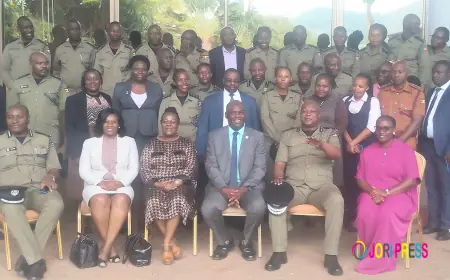Flush of glory! Uganda rolls out first WASH awards


On Friday night, the red carpet at Kampala’s Protea Hotel will look a little different.
Instead of pop stars or movie idols, the spotlight will fall on engineers who have built boreholes in forgotten villages, youth who have mobilized neighbors to dig pit latrines, journalists who have told the stories of cholera outbreaks, and researchers whose work has guided national sanitation policy.
It is all part of Uganda’s first-ever Water, Sanitation and Hygiene (WASH) Impact and Influence Awards, an initiative designed not just to hand out trophies, but to honor a fight that touches the health, dignity and survival of millions.
A CELEBRATION ROOTED IN CRISIS
The scale of Uganda’s sanitation challenge is staggering: more than 30 million people still lack access to safe toilets. Millions fetch water from unprotected sources, fueling recurrent outbreaks of cholera, typhoid and other preventable diseases.
For schoolchildren, especially girls, the absence of proper toilets means missed classes and early dropouts. For mothers, it can mean life-threatening complications during childbirth.
“This is one of the most crucial public health priorities affecting our people,” said Dr Herbert Nabaasa, commissioner of Health Services for Environmental Health at the ministry of Health.
“The burden of disease in this country is closely tied to poor sanitation, unsafe water and weak hygiene practices. We need to reduce that burden, and part of doing so is recognising and celebrating those who are driving solutions.”
Launched in May by the Uganda Water and Sanitation Network (UWASNET), in partnership with the ministries of Health, Water and Environment, and Education and Sports, the awards are supported by the Austrian Development Agency and a coalition of local and international partners.
FROM SCARCITY TO CELEBRATION
For years, WASH work has labored in the shadows, seen as a technical backwater of development, rather than the foundation of public health. The awards aim to change that narrative. “We want to use these awards as an incentive,” Dr Nabaasa explained.
“To showcase innovation, to highlight the best actors, and to raise public awareness in ways that inspire lasting change.”
The awards are structured across seven categories, each designed to capture the breadth of contributions. Programmatic Impact will recognize community initiatives that have delivered measurable results, while Youth-led Initiatives will honor young people pioneering grassroots solutions.
Technology, Innovation, and Financing will highlight new tools and funding models reshaping the sector, and Media Excellence will celebrate journalism that has influenced public understanding and policy.
Research and Academia will recognize scholarship advancing evidence-based practice, while the Lifetime Achievement category will honor individuals whose decades of dedication have transformed Uganda’s WASH landscape.
“This diversity of categories is deliberate,” said Charles Opolot, events consultant with the HAP WASH Promotion Initiative. “By recognising excellence in multiple sectors, we are saying: WASH is everyone’s business.”
The journey to Friday’s gala has taken months. Nominations opened in May, drawing submissions from districts across Uganda. Civil society organizations put forward community health workers who have braved floods to deliver soap and chlorine tablets.
Universities nominated lecturers whose studies have reshaped latrine design. Youth groups submitted digital apps tracking handwashing behavior in schools. A jury of practitioners and policymakers reviewed the entries, shortlisting finalists whose work will be showcased at the ceremony.
Each finalist’s story is being documented and archived to form a national repository of case studies. Organizers hope these examples will inspire replication far beyond the awards night.
MORE THAN A TROPHY
Behind the symbolism is a serious strategy. By celebrating champions, the government and its partners hope to build momentum for reforms that have long stalled. Uganda’s National Development Plan III sets ambitious WASH targets, but funding remains a fraction of what’s needed.
With foreign aid declining, progress depends increasingly on domestic mobilization and innovation.
“We call upon the public, the private sector, academia, civil society, and especially the youth to actively participate,” Dr. Nabaasa urged.
“This is how we accelerate progress in WASH, by bringing everyone to the table, celebrating success, and building momentum for change.”
A NIGHT OF RECOGNITION, A FUTURE OF RESPONSIBILITY
On October 3, the spotlight will shine on those who have labored in obscurity, teachers keeping handwashing stations alive, district officers running vaccination campaigns, or entrepreneurs designing toilets that households can actually afford.
But the gala is also a reminder that Uganda’s sanitation crisis is far from solved. Each award is both recognition and challenge, honoring the work done while underscoring the millions still without clean water or safe toilets.
For a sector too often defined by scarcity, the awards are a chance to recognize something else: ingenuity, resilience, and hope. And for the communities still waiting, they are a promise that their struggles are no longer invisible.
What's Your Reaction?
 Like
0
Like
0
 Dislike
0
Dislike
0
 Love
0
Love
0
 Funny
0
Funny
0
 Angry
0
Angry
0
 Sad
0
Sad
0
 Wow
0
Wow
0

















































